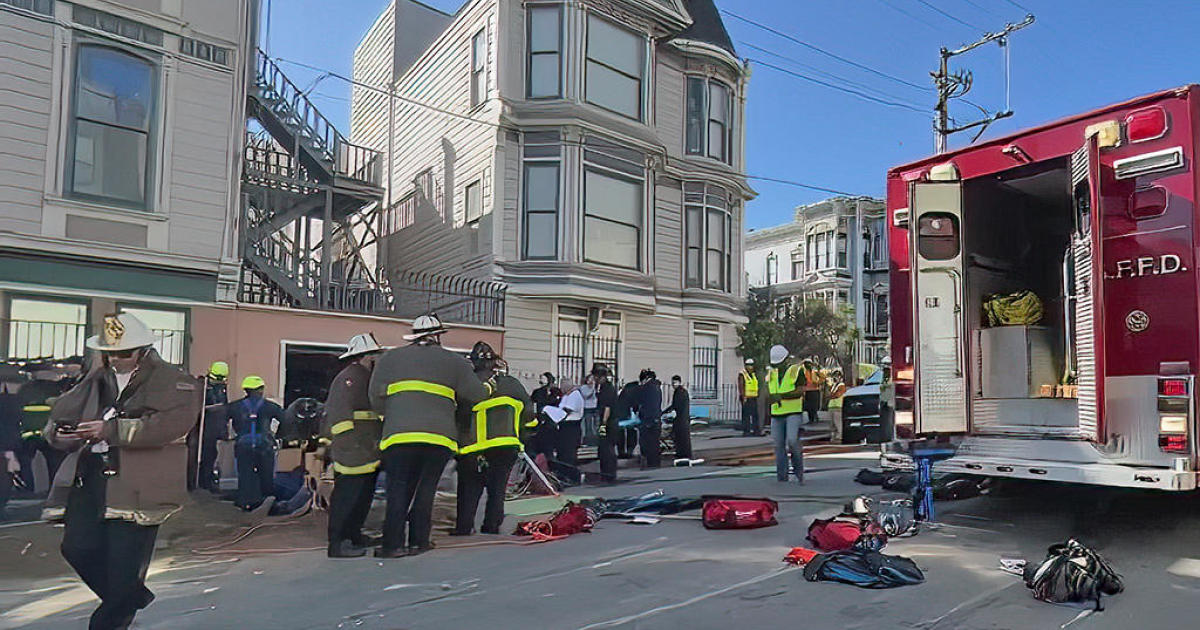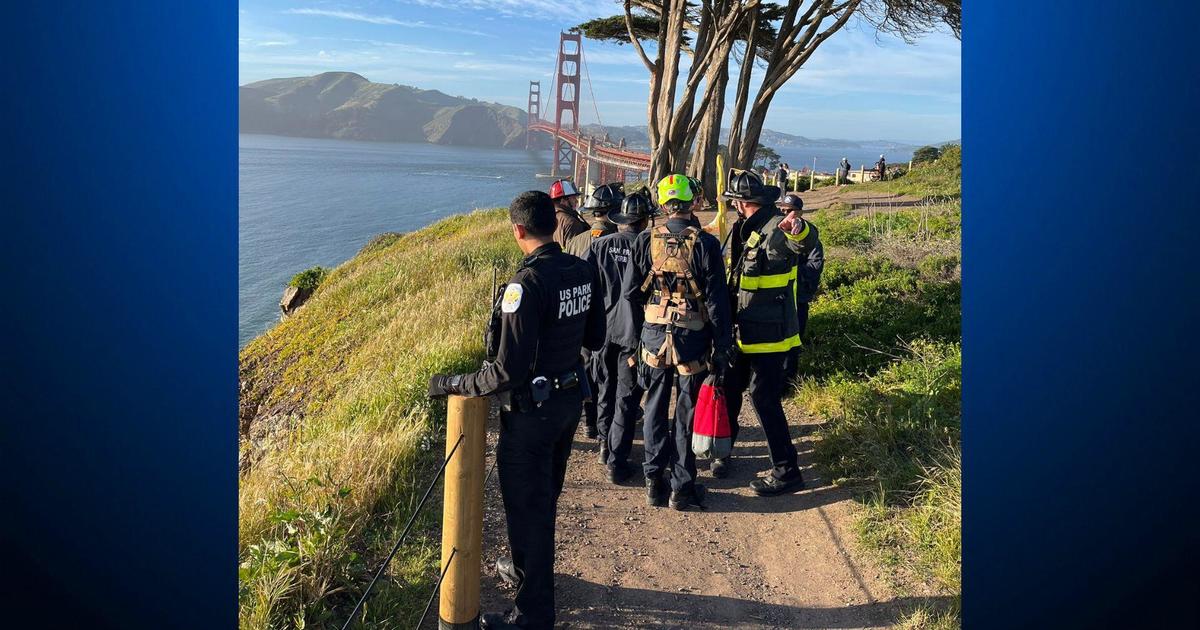COVID: Vaccine A Shot Of Relief For Many Suffering With Mysterious 'Long-Haul Syndrome'
SAN FRANCISCO (KPIX) -- As this pandemic continues to unfold and evolve, scientists now estimate 10 to 30 percent of patients infected with COVID-19 will develop a mysterious ailment now known as 'long-haul syndrome.' The syndrome is a constellation of lingering, debilitating health problems that last for months or even longer.
Now, according to patients, it appears that the vaccine may offer some kind of benefit as a treatment.
One patient is Bruce Wheeler from Marin County. During the very early days of the pandemic, before the lockdown, Bruce had traveled overseas with his wife. When he returned, he felt ill. A subsequent test revealed he had been exposed to the novel coronavirus. Since the symptoms appeared quite mild, at that time he was not overly concerned.
"The symptoms went away in about 10 days and I felt some fatigue. But that was about it," recalled Wheeler.
A few months later and he tested negative for SARS-CoV-2. Bruce felt better. He thought his ordeal was over. But the nightmare was just beginning.
"I began to get a series of new symptoms," said Bruce. The symptoms included shortness of breath, extreme fatigue, brain fog, and horrible headaches.
"It was like 2 daggers right into my temple," said the retired banker.
Wheeler is one of many in the U.S. who now are suffering from long-haul syndrome.
" I'd be up for an hour or 2, and need to go back to bed, " explained Webber.
Another member of the club is Laura Gross
"I didn't feel like me anymore," she exclaimed.
Gross is a branding and marketing consultant. The impact of the viral infection dealt a devastating toll. Laura's upbeat personality took a dark turn into a deepening sadness. It really surprised her.
"I'm a pretty 'happy little chappy.' I'm not a sad person. So, it took me away from me," noted Laura on the profound impact the virus had on her mentally.
Gross tested positive a year ago, and just as in Bruce's case, the virus appeared to disappear. She tested negative in a few months after her infection. That's when the terrifying symptoms began.
"I had joint pains, I had muscle aches. I had a low-grade fever. I had acute confusion.
I could not think straight," explained Laura. She called her brain fog more like a brain cyclone.
She said if your brain is like a computer, you've organized what you know into folders: personal, business, family, et cetera. With a SARS-CoV-2 infection, it is as if a cyclone is blowing full force, pushing all the folders open and up in the air, too far to reach to sort back in order.
Webber and Gross have lived with Long-haul syndrome for more than a year. Recently, they became eligible for a COVID-19 vaccine.
After vaccination, they both felt pretty crummy, if not downright sick.
But within 72 hours, the inexplicable occurred. Laura woke up and, for the first time in a year, felt normal.
"I'm back," she remembered thinking. Her brain fog lifted as did the vaccine-induced mood.
"I couldn't believe it. I had so much energy and I was back in my head again," said Gross.
"It's been a very pleasant surprise," Webber remarked.
Webber was getting help from an integrative health team at UCSF and felt their holistic approach was helping. But after getting vaccinated, he described an acceleration in the improvements in symptoms. His memory improved and he was getting fewer headaches. The once avid Alpine hiker felt hope.
"For the first time in over a year, I can now go out and not hike mountains, but hike with inclines, and not flat surfaces," said Bruce.
No one knew if a Covid vaccine would exacerbate these problems. Long-haulers were obviously not included in any of the clinical trials that led the vaccines' Emergency Use Authorizations. When the vaccines began to roll out, Long-haulers took a deep breath.
"We were prepared for every terrible side effect known to man," said Diana Berrent.
Berrent heads up Survivor Corps. Members are COVID-19 survivors who are highly motivated to share data with researchers.
"We were able to do a poll," said Berrent.
In a recent poll, among 900 long-haulers who got COVID-19 vaccinations were asked what happened in the aftermath. Fourteen percent felt worse, 45 percent felt no difference, but 40 percent felt better, citing a slight relief or alleviation of symptoms, all the way to a complete resolution of problems.
"You could have knocked me over with a feather when we found out that people were actually improving," exclaimed Berrent.
"It's really interesting," said Stanford infectious disease expert Dr. Anne Liu. Dr. Liu told KPIX 5 some long-haulers who are treated at Stanford are reporting the same benefit. No one knows why.
Is it a treatment or coincidentally a spontaneous recovery?
"It's all hypothesis and speculation," explained Dr. Liu.
There are some leading theories. The vaccine could be clearing out leftover viral particles hiding out in the body, or it could be resetting a malfunctioning immune system. Another intriguing possibility is that the vaccine may do a better job at creating antibodies than the human body.
"We do have some evidence to suggest that the antibodies in response the vaccine may be at higher levels and in better quality than the antibodies made by natural infection," noted Dr, Liu.
Dr. John Swartzberg, an infectious disease public health expert at UC Berkeley said this phenomenon requires rigorously produced scientific evidence.
"This demands a lot of study," said Dr. Swartzberg.
Dr. Swartzberg went on to note that long-haulers need our help. Without understanding why and how the syndrome occurs will lead to less-than-optimal treatments. And that places a horrible burden on patients, their loved ones, and society at large.
"It could lead to an awful lot of people not functioning well in society and needing a lot of medical resources," explained Dr. Swartzberg.
As for Gross and Webber, neither are 100 percent cured of their syndromes but they feel better and are encouraged.
"I knew there was a light at the end of the tunnel. Now I feel like I can almost see that light," said Webber.
"Here's what I think: give it a shot," added Gross.
Survivor Corps is now working with researchers to better understand this surprising benefit.



